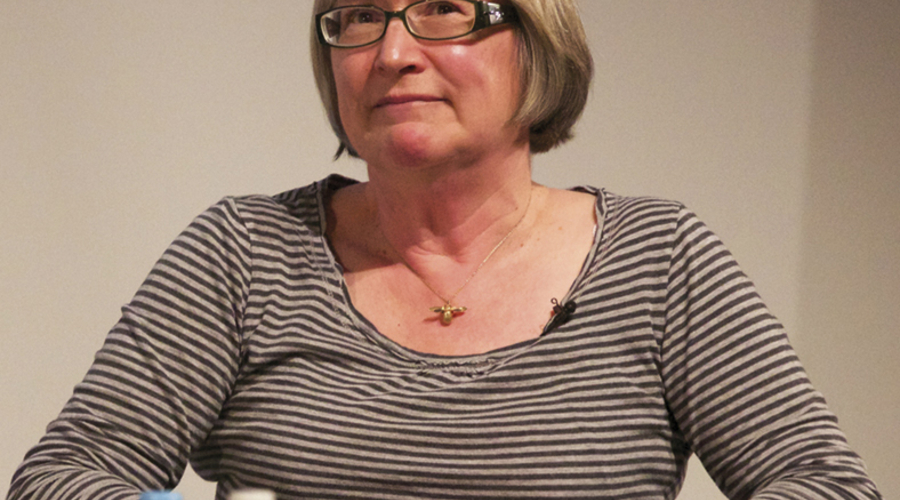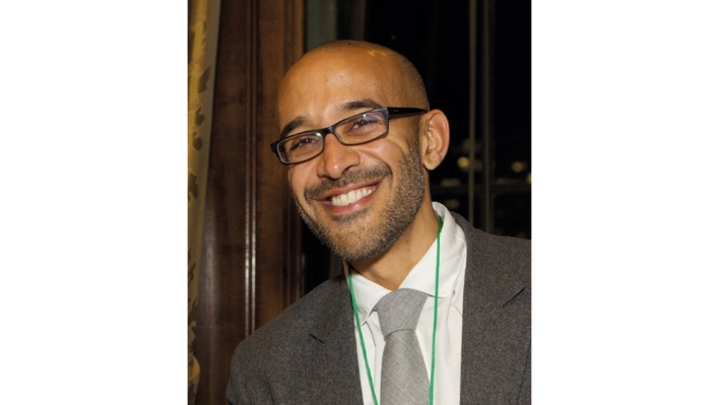Gwyneth Hughes shares her approach to the craft of screenwriting with Matthew Bell

Gwyneth Hughes is one of the most versatile writers working in British television. Her screenplays encompass crime serials, costume drama and fact-based pieces.
Her credits include: thriller Five Days; The Mystery of Edwin Drood; The Girl, the story of Alfred Hitchcock’s obsession with Tippi Hedren; and U Be Dead, based on the story of a real-life stalker.
This month she branches out in a new direction with a three-part ghost story for BBC One, Remember Me.
Interviewed for the RTS Student Programme Masterclass by executive producer Ruth Pitt, a former colleague from Yorkshire Television, Hughes described her style as “overwrought, emotional melodrama with a social-realistic core”.
Remember Me, starring Michael Palin, making a welcome return to straight acting, is a “weird hybrid of a kitchen-sink drama and ghost story”, she added.
Hughes, whose father was a London police constable, was the first in her family to go to university, where she studied Russian history.
She worked first in print journalism and then in television news, before directing TV documentaries, including Channel 4’s Mercy for Myra Hindley?
“What all these things have in common is storytelling,” said Hughes.
 “The great thing about journalism as a starting point is that you meet a lot of people who you would never normally come across,” she continued. “It’s not a prerequisite for becoming a successful screenwriter; it’s just the way it happened for me. It means that I’ve been able to populate my dramas with a lot of different people – I’m not just mining my own, rather limited, experience of life.”
“The great thing about journalism as a starting point is that you meet a lot of people who you would never normally come across,” she continued. “It’s not a prerequisite for becoming a successful screenwriter; it’s just the way it happened for me. It means that I’ve been able to populate my dramas with a lot of different people – I’m not just mining my own, rather limited, experience of life.”
While working in factual TV, Hughes started to write fiction, and submitted a short story to Radio 4, which was accepted. A brief stint writing for ITV cop show The Bill in the mid-1990s and on programmes such as long-running BBC forensic pathology series Silent Witness followed, before Hughes penned her first original work, the ITV two-parter Blood Strangers.
One day at the end of the 1990s, Hughes came across a newspaper story about a Barnardo’s project in Bradford. “See if this reminds you of anything,” she told the audience. “The charity was working with white, teenage girls who were being groomed by Asian men.”
“As a baby writer, you go into the industrial sausage machine, working on shows such as The Bill or Doctors. The issue is, can you get out the other end?” Hughes said.
“You can stay there and earn a lot of money – some of the highest paid screenwriters in British television work for EastEnders and Coronation Street – but if you don’t want to do that, you’ve got to get that first original piece away. That was what Blood Strangers did for me.”
In 2007, the BBC One serial Five Days, following the investigation into a young mother’s disappearance, confirmed Hughes’ arrival as a major TV writer

Writing about crime, argued Hughes, “is a shortcut to big issues of right and wrong and truth and falsehood. The stakes are automatically very high – I struggle with stories where no one dies.”
At face value, the 2007 BBC One film, Miss Austen Regrets – for which Hughes won a Writers’ Guild of Great Britain award – seems to have little in common with the writer’s TV thrillers.
However, she hoped that both her crime work and the Jane Austen biopic were grounded in Britain’s common culture and evolving national identity.
Hughes nabbed another Writers’ Guild award for The Girl, her BBC/HBO drama about Alfred Hitchcock’s infatuation with (and bullying of) Tippi Hedren, star of The Birds and Marnie. “It’s another big, British story – Hitchcock is, artistically, a great hero of mine,” she said.
Next up is an adaptation of Charlotte Brontë’s final novel, Villette. “If any of you have read it, you’ll know already that it can’t be dramatised,” she said.
And in a radical departure from her normal, home-grown subject matter, she is penning a western for HBO, albeit one with a woman at its core, an outlaw associate of Jesse James, Belle Starr.
“HBO is calling this its feminist western, so I hope in the end we’ll all agree on what such a thing might look like!,” she smiled. “It’ll be fine.”
Screenwriter Gwyneth Hughes was interviewed by executive producer Ruth Pitt at the RTS Student Programme Masterclasses, held at the BFI, London, on 27 October. The producer was Helen Scott.
Hughes on screenwriting
‘Everything you write is very personal; the thing that it shouldn’t be, is autobiographical. We’re writers, we’re not interesting people, we sit at home in a corner.’
‘The most important thing we do is write suspense. It doesn’t matter if it’s a romantic comedy or a thriller… the audience must care what happens next.’
‘It takes a lot of time [to write a screenplay] and you have to be prepared to put up with everybody else’s ideas – if you don’t want to work in a team, write a novel.’
‘I’d much rather do the research… writing the script is hell.’
‘In a screenplay… everything is significant and has to pay off… you cannot set a hare running without giving it a resolution. That makes it a very technical, draughtsman-like way of working… You don’t have the freedom that a novelist has, but nor do you have the solitude.’

Question & answer
Q Do you follow the advice of screenplay-structure writers such as Robert McKee?
A I do bear those kind of things in mind – but only because my producers are looking for them. I think they’re pretty much merit-free for television writers.
Q Do you sacrifice truth for drama?
A When I’m doing factual drama, there’s a lot of pressure to make those true stories fit the template of the Hollywood movie… but the way to make that happen is not to jettison the truth…
I try so hard to keep it as true
as possible and I’m to be found bleating constantly, especially with the Americans.
Q How do you write authentic dialogue?
A You’ve got do the work – listen and read a lot… You can put modern notions into 19th-century people, but they have to express them in an adequately 19th-century way.
If you did it realistically, we’d all be lost because their speeches are so long. It’s one of the problems with Villette: Brontë doesn’t give you a single line you could put in a film.
Q How do you overcome writers’ block?
A I don’t get writers’ block… it’s partly because, if you’re doing it for a living, then you’re writing for someone who is on the phone wondering where your script is. What you have is deadline issues… or knotty, specific plot problems.
Q Do directors interfere with your vision?
A You have to be prepared to give your baby up for adoption… to the producer, then to the director they hire. The director gives it up to the cast and the cast to the audience.
You lose control in a maternal way very early on… A director wants to put your story [on the screen] but in a way that will be most glorious for him… You give your baby up to them and you have to hope they care what you think.
Q Do you mind doing rewrites?
A Some writers are very difficult about rewriting, but most of us aren’t, because we know that’s the deal. I’ll do as many rewrites as it takes, as long as the script keeps getting better.







